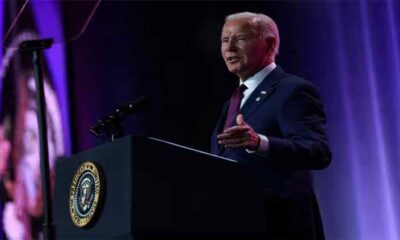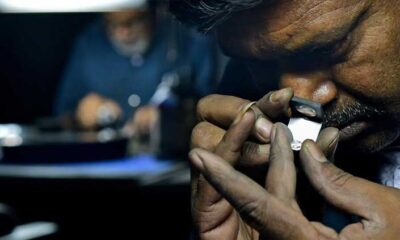The April visit to a Houston clinic was just one of a never-ending assembly line of medical appointments Abdul Wasi Safi has had since his January release from an immigration detention center.
The former Afghan soldier, called Wasi by family and friends, sat in a dental chair and conversed in Pashto with his older brother Sami as Carrie Underwood’s “Cowboy Casanova” played in the background. It was a scene thousands of miles from the places he’d been the past two years.
After the US withdrawal from Afghanistan in August 2021, fear of retribution from the Taliban for sharing information with American soldiers while he was an intelligence officer drove Wasi Safi to flee to Brazil. The goal? Reaching the US and applying for asylum.
He eventually made it after crossing 10 countries, but the journey came at a high cost. A brutal beating by police officers in Panama severely damaged his teeth and jaw and left him with permanent hearing loss.
Wasi Safi didn’t appear nervous during his visit to the San José Clinic, a facility that serves low income and uninsured individuals. But dentist Michael Wisnoski still reassured him, telling him it was going to be an “easy day.” He got two fillings but more complicated dental work loomed ahead.
Easy days for Wasi Safi have been few. His mind races with worry about his health. There’s also the uncertainty of whether he’ll be granted asylum. And he feels powerless to help his parents and other siblings, who have been threatened back in Afghanistan.
“I am scared for my life. I don’t know about my future. I don’t know what this government, what the United States (will) do with me,” Wasi Safi said.
It’s fear and frustration felt by other Afghans in the US as well as by immigration activists, attorneys and others, who ask that those who were evacuated from Afghanistan receive permanent legal status and those left behind be given a path to safety.
“I do think that our government needs to take responsibility and figure out how to fix it, because these are people who helped us,” said Debbie Berman, an attorney with the Chicago-based law firm Jenner & Block that’s representing Afghans still trying to flee their country.
More than 88,500 Afghans who worked with American soldiers as translators and in other capacities since 2001 have arrived in the US on military planes since the chaotic withdrawal, according to the US Department of Homeland Security. Most were admitted under a program called humanitarian parole that grants them some legal status, including the ability to work.
However, many others were left behind and some, like Wasi Safi, made their way to the US on their own — seeking the fulfillment of a promise of protection the US made to its Afghan allies. It’s a promise many feel has been broken.
Wasi Safi’s monthslong journey on foot and by boat last year took him through raging rivers and dense jungle to the US-Mexico border, where he was arrested in September and sent to a Texas detention center. With the help of lawyers and lawmakers, he was freed and reunited with his brother, who was a translator for the US military and has lived in Houston since 2015.
Wasi Safi’s attorneys didn’t return calls or emails seeking comment on his asylum case.
His arrest at the border and the expedited removal order that remains in place likely complicate his asylum case, said Alex Miller, with the American Immigration Council, an advocacy group.
“It just is an incredible uphill battle,” said Miller.
Wasi Safi and other Afghans seeking legal status in the US are doing so within an already backlogged immigration system.
“They’re just being added to this pile that the immigration judges are” handling, said Aleksandar Cuic, director of the Immigration Clinic at the School of Law at Case Western Reserve University in Cleveland.
The Afghan Adjustment Act, a proposed law to streamline their immigration process, has stalled in Congress. As of the end of April, only about 8,100 applications for asylum or special visas for Afghans employed by the U.S. government had been approved, according to Homeland Security.
Wasi Safi was set to plead his case for asylum before an immigration judge in July. But that’s been delayed to December. The postponement was a gut punch for the Safi brothers.
“Every time I’m having a piece of hope, they somehow take the hope away from me,” said Sami Safi, 30.
Wasi Safi’s unresolved immigration status has meant he’s not authorised to work. It’s also left him afraid to leave his Houston home.
“Home is like jail for me. I hope they give me my paper (legal documentation) and I start my life,” Wasi Safi said.
If home is a cage, the Al-Noor Society of Greater Houston, a mosque in the city’s diverse Gulfton neighborhood, has provided some outside solace.
In the midst of Ramazan on a Friday in April, the mosque’s main prayer hall was filled with about 200 men and boys, some wearing Houston Astros jerseys or carrying bags emblazoned with the Texas flag.
“That’s why we come to mosque … asking God almighty to guide us, in the path of success, in the path of comfort,” Sami Safi said.
Zahoor Gire, Al Noor’s executive director, said the mosque is a place not just for prayer but a resource for many of the newly arrived from Afghanistan and other countries.
Community groups like Al Noor are the ones that help provide long-term support — including job training and activities for children — once the initial federal help ends, Gire said.
Ericka Pertierra, a local businesswoman who’s helped several Afghan families resettle in Houston, has taken on Wasi Safi’s case. Using her fundraising skills, Pertierra gathered money for his lawyers and persuaded doctors and dentists she knows to donate their services.
“They deserve it. They served our country,” Pertierra said of the brothers.
She’s trying to raise more money through a GoFundMe campaign for Wasi Safi’s long-term medical needs.
On May 23, Wasi Safi turned 27 years old. But eating birthday cake was out of the question due to pain from recent gum surgery.
“He says, ‘I’ll celebrate my birthday when I’m feeling better,’” Sami Safi said.
Post Views: 60


 Fashion3 months ago
Fashion3 months ago
 World3 months ago
World3 months ago
 World3 months ago
World3 months ago
 Sports2 months ago
Sports2 months ago
 Sports2 months ago
Sports2 months ago
 World3 months ago
World3 months ago
 Business2 months ago
Business2 months ago
 Tech3 months ago
Tech3 months ago






















